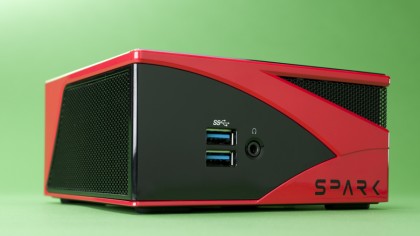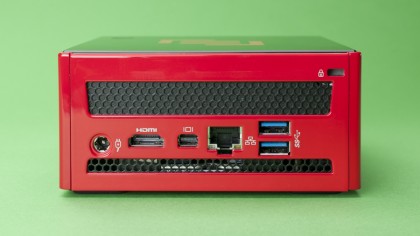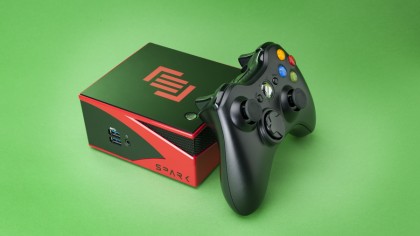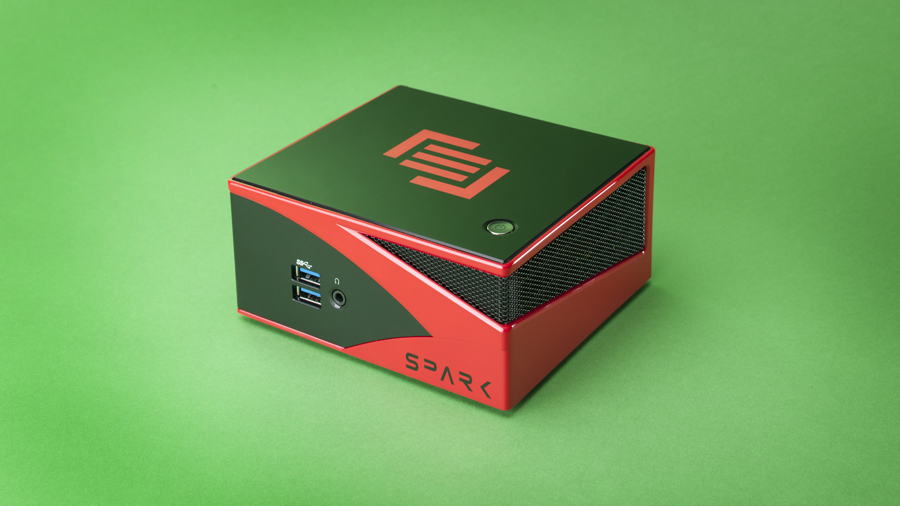Why you can trust TechRadar
The Maingear Spark has the form factor down pat. But the last thing you want is to spend a grand on a new gaming rig only to have to worry whether it's going to be able to run the latest and greatest games.

Unfortunately, that's exactly what will happen with the Spark. Even with the best possible specs, this micro-PC just doesn't have what it takes to chew through gaming's red meat. Here are the full details on the version sent to TechRadar:
Spec sheet
- Processor: 2GHz AMD A8-5557M APU (quad-core, up to 3.1GHz Turbo)
- Graphics: AMD Radeon R9 M275X, AMD Radeon HD 8550G
- Memory: 8GB Corsair DDR3 (1600Mhz)
- Storage: 128GB mSATA SSD (500MB/s read); 500GB 2.5-inch HDD (7,200 rpm)
- Connectivity: 802.11ac Wi-Fi, Bluetooth 4.0
- Operating system: Microsoft Windows 8.1 (64‐bit)
- Ports: 4x USB 3.0, HDMI, mini DisplayPort, Gigabit Ethernet, 3.5mm audio port
- Size: 2.34 x 4.5 x 4.23 inches (H x W x D)
- Warranty: 1-year comprehensive with lifetime "Angelic Service" labor and phone support
The only thing that could have been better in this rig, given its form factor, is the RAM, which can be upgraded to 16GB. On the other end of the spectrum, there's also a 4GB option for less money. Though, since the Spark is already lacking in the processing department, I'd advise against it.
There are several other hard drive options as well, including larger solid state drives and bigger mechanical drives that, if you decide to go with them, raise the cost of the system significantly. While you can't go wrong with a full terabyte, 500GB for a computer with a gaming focus is probably more than enough for most folks.

That said, having the SSD is a boon, making simple procedures like booting up super fast. You're also given two options for an external optical drive but, in this day and age, it's not necessary to have one. Having an ethernet port should be sufficient. Speaking of ports, considering the Spark is marketed as a living room PC, an optical audio-out would've been appreciated.
Sadly, there's no wiggle room on the AMD processor and Radeon graphics. For the most part, the standard components get the job done, but it never hurts to offer more power, particularly with how fast gaming tech is marching forward these days.
Performance
You can order a whole bunch of other extras along with your Maingear Spark, from a wireless Xbox 360 controller to a webcam. But when all is said and done, it's the Spark's performance that really matters. And whether this is the gaming rig for you depends on how much you expect from it.
Sign up for breaking news, reviews, opinion, top tech deals, and more.
If you want a rig that's future-proofed to last years with nary a hiccup, then you should probably invest the extra cash and go with something like the Digital Storm Bolt II. While the Spark can play plenty of current blockbusters, it stutters when the settings are turned up. Sometimes the machine can't hang even with settings all the way down – with certain games.
Benchmarks
- 3DMark: Ice Storm: 40,853; Cloud Gate: 5,083; Fire Strike: 2,301
- Cinebench Graphics: 35.04 fps, CPU: 146 points
- PCMark 8 (Home Test): 1,874 points
- BioShock Infinite (1080p, Ultra): 31 fps; (1080p, Low): 92 fps
- Metro: Last Light (1080p, Ultra): 8 fps; (1080p, Low): 25 fps
Seeing 8 frames per second on Metro is painful, though granted, it's a really, really taxing game. Thankfully, the Spark runs BioShock Infinite, another triple-A title released just last year, at a buttery smooth 30 fps on Ultra. (Be forewarned: In order to get those kinds of results, expect the Spark to sputter along loudly as it tries to keep up and stay cool inside.)
But even at the lowest settings, Metro was simply too slow to enjoy. With that in mind, how are games that come out next year going to perform? What about the year after that?

And the performance issues aren't relegated just to Metro, or even to the most high-end games. Indie platformer Lifeless Planet suffered frame rate drops unless the graphics were turned all the way down. And the just-released Gauntlet – by no means a pretty game, though one with lots of characters on-screen at once – slowed to a crawl every few minutes.
